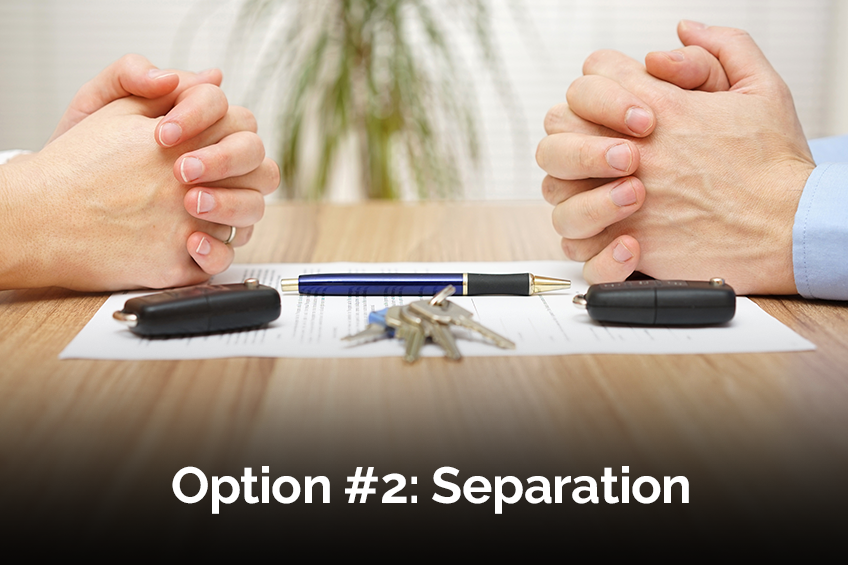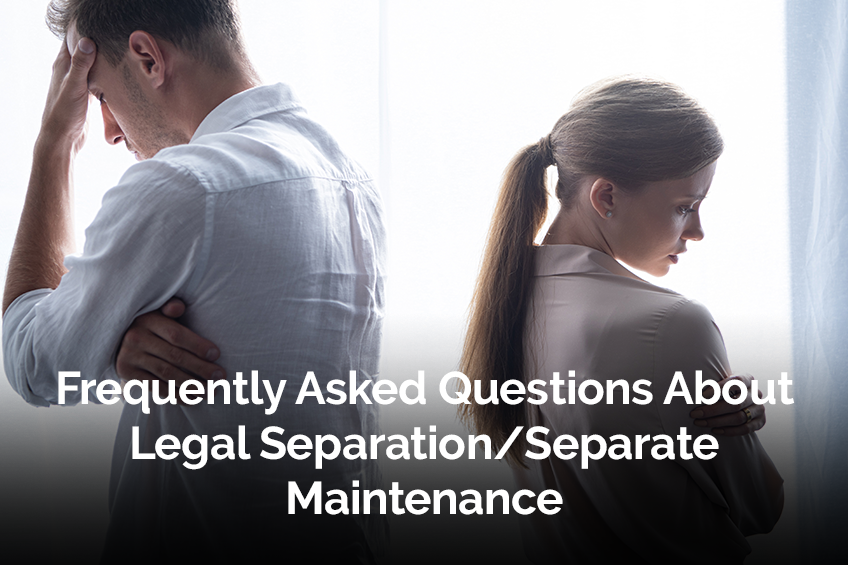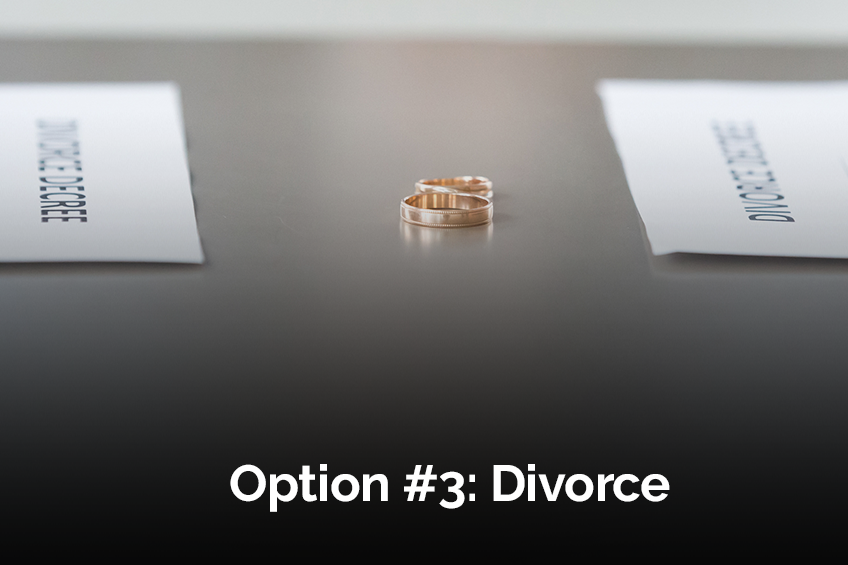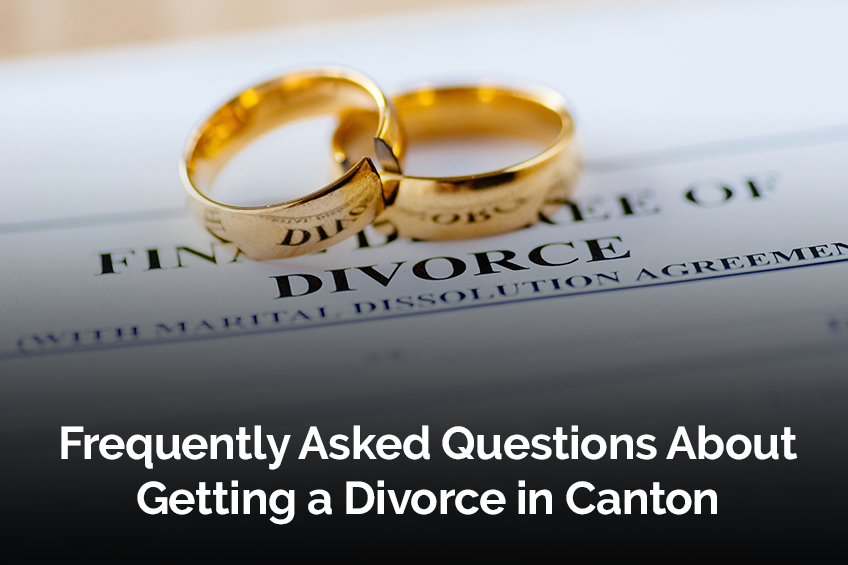
Know Your Three Options for Ending a Marriage Under Georgia Law
A marriage that’s on the rocks can be a huge strain on everyone, affecting family relationships, work and even the health of those involved.
It can sometimes be helpful to understand your legal options when staying together doesn’t seem like the best option anymore.
The three options you have for ending or pausing a marriage under Georgia law are: annulment, separation and divorce.
The requirements for and legal ramifications for each are somewhat different, so make sure you understand them all before you take that next step.

Option #1: Annulment
What is Annulment?
An annulment is a legal decree that declares a marriage invalid from its inception.
The ruling erases the marriage from a legal perspective, so that it is effectively as if the marriage never existed.
Annulment differs from divorce in that a divorce acknowledges the existence and validity of the marriage — it just legally ends that marriage.
Annulment doesn’t just end a marriage; it declares that marriage to be null and void altogether.
Grounds for Marriage Annulment in Georgia
The requirements for annulment in Georgia are quite specific and do not apply to most marriages.
These are the accepted legal grounds for annulment in Georgia:
- Close Relation Between Spouses: This includes marriage between parent and child or stepchild; grandparent and grandchild; aunt and nephew or uncle and niece.
- Mental Inability to Consent: This applies if either of the spouses lacked the mental capacity to enter into the marriage at the time.
- Under Age: One of the parties was under 16 at the time of the marriage.
- Force: One spouse was coerced into the marriage.
- Fraud: One spouse was fraudulently misled into marrying.
- Bigamy: Either of the parties was already married to another person at the time of the marriage.
Georgia law is fairly strict about not allowing annulments for marriages with children or with children on the way, however some exceptions do apply.
Talk to an experienced Georgia family lawyer if you have questions about whether you may meet the legal grounds for an annulment.
Why You Would Consider Annulment
The purpose of an annulment is to return each party to the legal status they would have had if the marriage had never taken place.
Ex-spouses can still lay claim to things like property rights, inheritances, benefits and alimony after a divorce, but an annulment, in most cases, returns things to the way they were before the marriage occurred and eliminates the possibility for
these and other spousal claims.
These issues may inform whether you choose to seek a divorce or an annulment after a marriage if you meet one of the grounds for annulment in Georgia.
Residence Requirement for Annulment in Georgia
In order to petition for an annulment in Georgia, one spouse must have lived in Georgia for at least six consecutive months.

Frequently Asked Questions About Annulment
Is There a Time Limit for an Annulment?
There is no time limit, minimum or maximum, for an annulment in Georgia. You just have to meet one of the requirements for an annulment under Georgia statute, which are fairly narrow.
Can We Get an Annulment If We Were Only Married for a Short Time/Failed to Consummate the Marriage?
While other states allow a failure to consummate the marriage as grounds for annulment, Georgia does not.
The length of the marriage has no bearing on eligibility for annulment, either; one of the grounds for annulment stated above must still apply.
Do I Need a Lawyer for an Annulment?
Georgia law does not require you to obtain legal representation to file for annulment, however it is a good idea to seek legal help or advice before you do.
An experienced family law attorney can make sure you meet the requirements for annulment and that all your paperwork is properly filed.
They can also help in complicated situations (if you have children from the marriage, for instance) or where proving the grounds for annulment may be challenging.

Option #2: Separation
What is Legal Separation/Separate Maintenance in Georgia?
Georgia does not have a statute for legal separation, however, they do allow couples to file for what is known as separate maintenance.
Filing for a separate maintenance action in Georgia does much the same thing as filing for legal separation elsewhere: it allows you and your spouse to live separately while still remaining legally married.
The difference between separate maintenance and divorce in Georgia is that a divorce legally ends the marriage, but a separate maintenance does not.
Grounds for a Separate Maintenance Action or Decree in Georgia
In order to obtain a separate maintenance action, the parties must be legally married, they must be living separately, and they must not have filed for divorce.
Filing for a separate maintenance decree in Georgia is similar to seeking a divorce. One of the spouses must plead for separate maintenance on the grounds that either:
- a) Both parties have agreed to a mutual separation OR
- b) The separation is due to misconduct on the part of one spouse.
As in a divorce, misconduct findings may affect things such as alimony, child support and custody rulings.
Benefits of a Separate Maintenance Agreement
The benefits of a separate maintenance decree are similar to those of divorce, and many of the same legal issues are decided by the court.
Separate maintenance agreements often rule on the following issues, as they do in divorce:
- Marital property and debt obligations
- Alimony
- Child custody and visitation arrangements
- Child support
Why You Would Consider Separate Maintenance Instead of Divorce
The reasons for considering separate maintenance may include religious, financial or personal considerations.
Separate maintenance may be desirable for those whose religions forbid or discourage divorce or for those wishing to avoid certain social stigmas around divorce.
Financial motivations for choosing separation over divorce include preserving spousal health insurance, social security or pension benefits and maintaining inheritance rights.
Some couples may choose separate maintenance while they work through major marital problems or financial issues that are straining the marriage.
The choice to file for separate maintenance can be highly personal and emotional for all parties involved.
You should consider talking to a family law attorney about all your options before making such a major decision. An experienced attorney can also help ensure your filing is done right and that issues like alimony, child custody and support are properly considered.

Frequently Asked Questions About Legal Separation/Separate Maintenance
How Long Can We Legally Stay Separated in Georgia?
Georgia has what is known as separate maintenance and it is different than what some other states call legal separation.
You can stay separated under a separate maintenance decree indefinitely, but you will legally still be married unless you divorce.
Can I Date Under Separate Maintenance in Georgia?
Technically, dating while under a separate maintenance agreement is considered adultery. You are still legally married according to Georgia law.
Can We Divorce After Separation in Georgia?
You can seek a divorce after a separate maintenance agreement in Georgia. Many couples who fail to reconcile and those who wish to remarry will go on to take this step.
How Does Separation Affect Child Custody?
Similar to divorce, an agreement is worked out with all the child custody and visitation arrangements outlined in detail as part of the separation maintenance agreement.
Child support, alimony and property division arrangements may be part of the agreement, as well.
Do I Need a Lawyer for a Separation?
Georgia law does not require a lawyer to file for separate maintenance, however it is recommended.
A family lawyer can make sure you handle everything properly and that agreements for alimony, child custody/support and property division are properly outlined and filed. They can also advise you on choosing separate maintenance over other options like annulment or divorce.

Option #3: Divorce
What is Divorce?
Divorce is the legal termination of a marriage between two people.
To obtain a divorce in Georgia, you must file a Complaint for Divorce, usually in the county where your spouse lives. One spouse must have been a resident of Georgia for at least six months in order to file.
There is also a 30-day waiting period after filing for divorce in Georgia.
Grounds for Divorce in Georgia
When you file for divorce in Georgia, you must choose one of 13 statutory grounds for divorce in Georgia. They are:
- Intermarriage by persons within the prohibited degrees of consanguinity or affinity.
- Mental incapacity at the time of the marriage.
- Impotency at the time of the marriage.
- Force, menace, duress, or fraud in obtaining the marriage.
- Pregnancy of the wife by a man other than the husband, at the time of the marriage, unknown to the husband.
- Adultery in either of the parties after marriage.
- Willful and continued desertion by either of the parties for the term of one year.
- The conviction of either party for an offense involving moral turpitude, under which he is sentenced to imprisonment in a penal institution for a term of two years or longer.
- Habitual intoxication.
- Cruel treatment, which shall consist of the willful infliction of pain, bodily or mental, upon the complaining party, such as reasonably justifies apprehension of danger to life, limb, or health.
- Incurable mental illness.
- Habitual drug addiction.
- The marriage is irretrievably broken.
No-Fault vs. Fault Divorce
The thirteenth stated ground above alleges no fault on the part of either spouse. For that reason, some refer to it as Georgia’s no-fault ground for divorce and to Georgia as a no-fault state as a result.
Filing for divorce under ground thirteen eliminates the need to prove fault on the part of either spouse and can streamline the divorce process.
Some couples may choose the no-fault ground for divorce, even if misconduct did occur, in the interest of expediency or privacy.
Choosing any of the other twelve grounds requires that the conduct or fault be proved in court.
A divorce judgement on conduct grounds may have implications for alimony, custody, child support and visitation, so consider your options carefully when deciding how to file.
Divorce vs. Separation or Annulment
Choosing divorce over separation or annulment has implications for family, property, legal and personal matters, as well.
An annulment eliminates any legal ramifications of the marriage, nullifying it as though it had never occurred. It usually precludes any claims to spousal property or benefits as a result.
A separation or separate maintenance maintains the legal fact of the marriage while allowing both spouses to live separately and without responsibility for one another. Arrangements for alimony, child custody/support and property division can still proceed as in a divorce.
You cannot, however, remarry if you have a separate maintenance agreement and you are technically not supposed to date others, either.
A divorce ends the marriage completely, while allowing for agreements like alimony, child custody, child support and property division according to the divorce judgement.
Every marriage situation is unique and the legal and personal issues can be overwhelming.
Consider seeking family or counseling support and always seek the advice of a family lawyer before making big decisions.

Frequently Asked Questions About Getting a Divorce in Canton
Do I Need a Lawyer to File for Divorce in Georgia?
You do not need a lawyer to file for divorce in Georgia, however, it is highly recommended.
Hiring a lawyer can ensure you meet all the requirements and file correctly. Moreover, even uncontested and no-fault divorces can become contentious or difficult and require the legal expertise of an experienced attorney.
How Do I Find a Divorce Lawyer?
A good first step may be to ask friends and family who have been through a divorce for recommendations. Getting a few names this way and following up with good research can help you cut through the many options out there.
Is Georgia a No-Fault Divorce State?
Georgia allows for divorce without alleging the fault of either party. You can state that the marriage is “irretrievably broken” and get a divorce without the burden of proving misconduct.
How Long Does My Spouse Have to Respond to a Divorce Filing? What if They Don’t Respond?
Once you file for divorce in Georgia, your spouse has 30 days to respond to the request.
A failure to respond means that the court will proceed with the divorce if the service of process is in order.
Canton attorneys Rachel Clark and Holly Holliman are experts in family law, with years of experience handling divorces, separations and annulments in Cherokee County.







